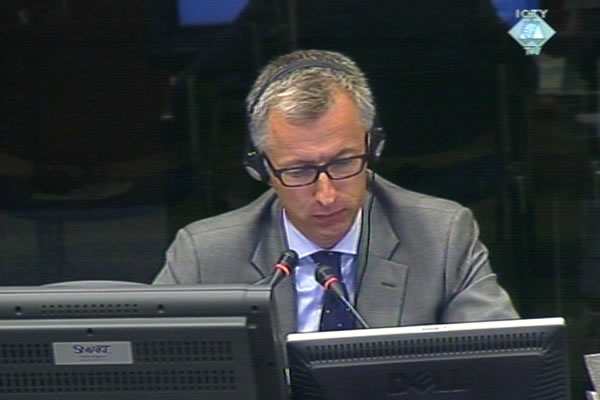Home
‘UNOFFICIAL’ CALL TO ARKAN FROM BIJELJINA
Prosecution military expert Reynaud Theunens wrote an expert report for the trial of Radovan Karadzic. In the report, Theunens claims that the SDS took over power in Bijeljina with the help of Zeljko Raznatovic Arkan and the local Serb Territorial Defense. Karadzic tried to prove that ‘somebody unofficial’ called Arkan to help after the ‘Muslim extremists’ set up roadblocks and opened fire at Serbs
 Reynaud Theunens, witness at the Radovan Karadzic trial
Reynaud Theunens, witness at the Radovan Karadzic trial Military expert Reynaud Theunens continues his evidence at the trial of Radovan Karadzic. This is Theunens’s seventh testimony before the Tribunal. Theunens was asked by the prosecution to write an expert report, entitled Radovan Karadzic, the Territorial Defense and the VRS from 1992 to 1995.
Explaining the methodology of his research in the report, the witness said that his conclusions on Karadzic’s role in the war in BH and his jurisdiction over the Territorial Defense and the VRS were based on laws and regulations of the former Yugoslavia and various documents created between November 1991 and the end of 1995. In most cases, the documents were written by Serb officials and authorities in Republika Srpska and FRY.
In the examination-in chief, the prosecutor used documents which show that Karadzic, as supreme commander of the armed forces, had the authority over the Territorial Defense, and later over the VRS. According to the witness, at a Serb Assembly session on 24 and 25 March 1994, Karadzic confirmed that he had de jure authority over the army. As Theunens explained, this stemmed clearly from the Republika Srpska laws and regulations and from the directives and orders Karadzic issued during the war.
The prosecutor pointed to several directives Karadzic issued during the war, including the notorious Directive 7, ordering the VRS to carry out ‘planned and well-thought-out combat operations [to] create an unbearable situation of total insecurity, with no hope of further survival or life for the inhabitants of Srebrenica or Zepa’. The order was implemented in Operation Krivaja 95 in July 1995.
Commenting on the approval Karadzic issued on 9 July 1995, authorizing the continuation of the operation to seize Srebrenica, the witness said that given Karadzic’s function as the supreme commander it was in effect an order. Although Karadzic ordered his troops to ensure safety of UNPROFOR and civilians in the enclave under the UN protection, Karadzic did nothing to check if this was done, the witness noted.
The prosecutor brought up documents which confirm that the Serbian Democratic Party played a key role in organizing the territorial defense in the municipalities the Serbs regarded as their own. The SDS procured the weapons and issued guidelines stipulating how the territorial defense should be organized and about its relationship with the JNA, the witness said. The witness recalled that at an Assembly meeting in March 1992, Karadzic called on the municipalities to form crisis staffs and urged the Territorial Defense units to subordinate to the JNA.
Karadzic started his cross-examination by putting to the witness that the objective of the prosecution witness’s report was to ‘reinforce’ the indictment. The witness rejected the claim, saying that he made his expert report as objective as possible. As he explained, his conclusions were corroborated by documents.
Karadzic challenged the conclusion from the expert report that Zeljko Raznatovic Arkan’s Serbian Volunteer Guard and the Territorial Defense attacked Bijeljina on 31 March 1992, killing 48 civilians; these events were followed by the SDS taking over power in the town and establishing the crisis staff. According to Karadzic, ‘Muslim extremists’ first threw a grenade at a Serb café, set up roadblocks, and fired at Serb civilians from the roofs of the mosques and churches. After that, ‘somebody unofficial’ called Arkan to reestablish law and order in the town.
‘I haven’t seen any evidence of that, but if you have any, I will take it into consideration’, Theunens replied. As he insisted, the conclusions about the events in Bijeljina were based primarily on the contemporaneous documents produced by the Serb police and municipal authorities.
Karadzic continues his cross-examination of the prosecution military expert tomorrow.
